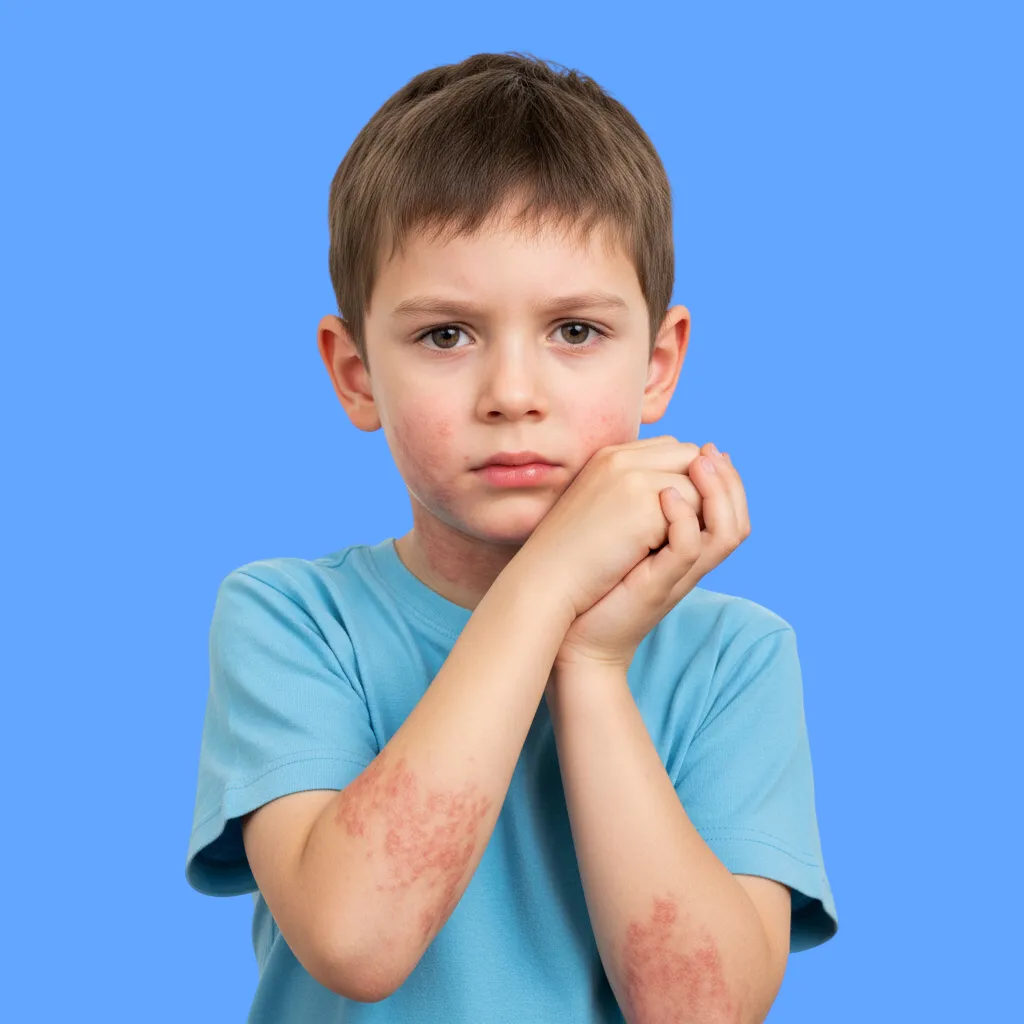What is eczema?
Eczema is a chronic skin condition that causes inflammation and irritation in the skin, often accompanied by intense itching, dryness, and flaking.
It usually appears as red or swollen patches and may develop into small blisters or crusts.
The condition is not contagious, but it can be very uncomfortable and significantly affect the patient's quality of life, especially when symptoms are frequent or severe.
Eczema affects people of all ages, but it is more common in children and may be associated with other allergic conditions such as asthma or allergic rhinitis.
What causes eczema?
There are several common causes of eczema, including:
- Genetic factors, especially if a family member has allergies or asthma
- A weakened immune system that triggers an overreaction in the skin
- Exposure to irritants such as soap, detergents, and perfumes
- Ongoing stress and psychological pressure
- Weather changes, especially cold and dry conditions
- Allergies to certain foods, dust, or pets
What are the common symptoms of eczema?

Patients may experience several common symptoms, including:
- Persistent and intense itching
- Red or dark patches on the skin
- Dryness and flaking of the skin
- Appearance of small blisters or crusts
- Thickening of the skin in affected areas
- Cracked skin with occasional fluid discharge
When should you see a doctor?
It is recommended to consult a doctor urgently if any of the following occur:
- Itching or rash persists for more than a week without improvement
- Signs of infection appear, such as pus, swelling, or fever
- Sleep or daily activities are affected by the symptoms
- Eczema spreads to new areas of the body
- No response to home treatments or usual creams
How is eczema diagnosed?
Eczema is diagnosed using several methods, including:
- Clinical examination by a dermatologist or family doctor
- Reviewing the patient's medical and family history
- Allergy tests to identify triggering substances
- Patch testing to determine the type of allergic eczema
How is eczema treated?
There are several treatment options for eczema, including:
- Topical corticosteroid creams to reduce inflammation
- Moisturizing the skin with special ointments after bathing
- Antihistamines to relieve itching
- Antibiotics in case of skin infection
- Light therapy or laser treatment for chronic cases
- Avoiding triggers such as harsh soaps or synthetic fabrics
Can eczema be cured?
Eczema is not completely curable in most cases, but it can be well managed.
Some children outgrow it as they get older, while adults may need ongoing care.
Commitment to treatment and avoiding triggers helps reduce flare-ups and improve quality of life.
What are the tips for preventing eczema?
Here are some helpful tips to prevent eczema:
- Moisturize the skin daily with suitable creams
- Use gentle, fragrance-free soap
- Wear cotton clothing and avoid wool or nylon
- Avoid stress and psychological pressure as much as possible
- Avoid foods or substances that cause allergies
- Maintain a humid environment, especially in winter
What are the possible complications of eczema?
Neglecting treatment may lead to several complications, such as:
- Bacterial or viral skin infections
- Painful skin cracks
- Sleep disturbances due to itching
- Changes in skin color or thickness
- Psychological effects such as anxiety or depression
Frequently asked questions about eczema
Can eczema appear on the face?
Yes, especially in children or in cases of seborrheic eczema.
Is eczema related to allergies?
Often, and it may result from the body's reaction to allergens.
Does eczema appear suddenly?
Yes, and it can worsen quickly when exposed to triggers.
Can natural remedies be used?
Yes, such as aloe vera gel or oatmeal, but they do not replace medical treatment.
Article summary
Eczema is a chronic skin condition that can be managed effectively. It often starts with itching and progresses to rash and flaking.
Its causes include genetics, stress, and irritants. Treatment involves moisturizing, topical medications, and avoiding triggers.
Seeing a doctor is essential when symptoms worsen. Prevention depends on daily skin care and avoiding provoking factors.
Early attention helps reduce complications and improves the patient's life.